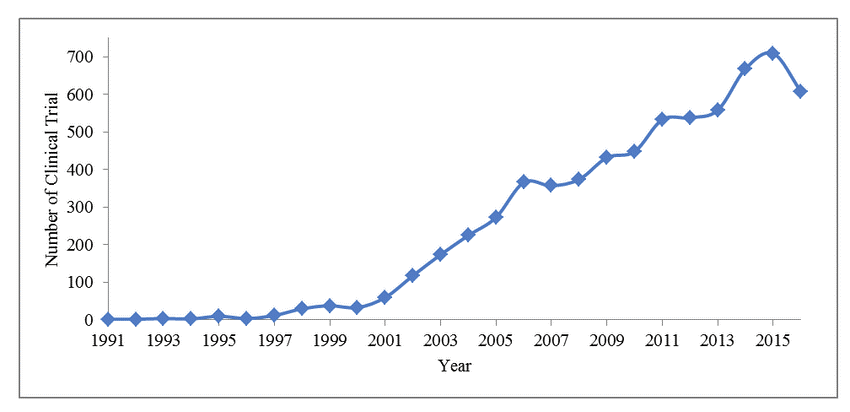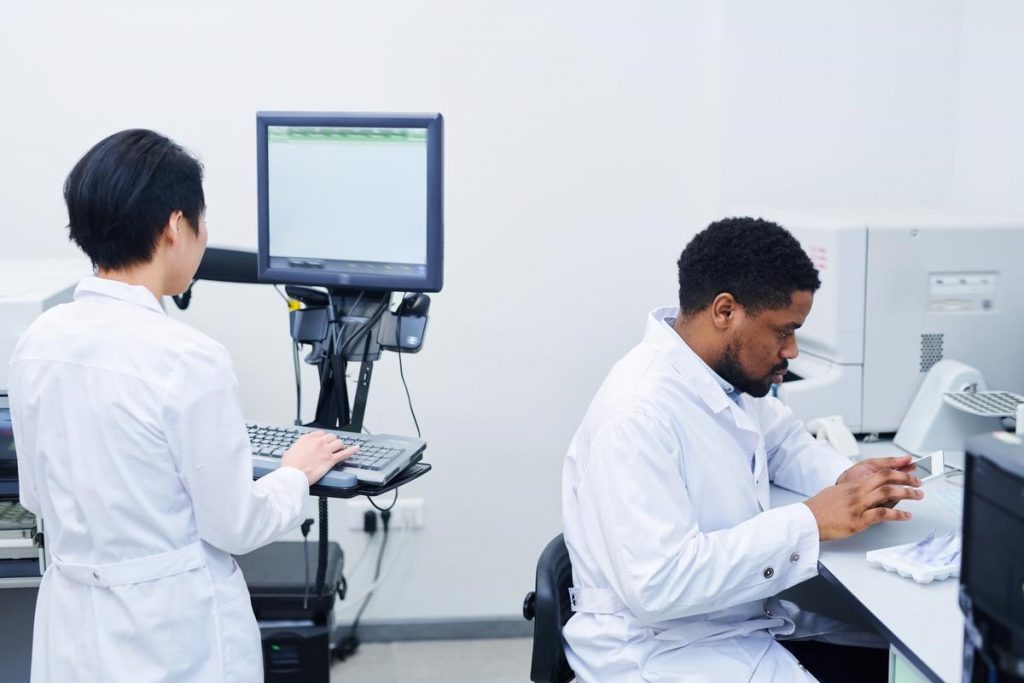Clinical research scientists are accountable for conducting research in laboratory settings. They also analyze diseases and ailments to devise a more reliable means of treatment and diagnosis. They are usually employed in research departments of private and government organizations. Besides, they can work in hospitals, university labs, and corporations associated with research, medical, and pharmaceutical industries.
However, employers prefer candidates with a master’s degree in biological sciences or medicine. A PhD degree in clinical research will be an add-on qualification to lead the entire team of researchers.
Their work often entails the utilization of specialized machines, software, and other research tools. They use these tools to study potentially hazardous materials such as blood samples and pathogens.
Clinical research scientists fundamentally conduct scientific research and clinical investigations of various diseases. Thereby, they identify health conditions and aid physicians and regulatory bodies in determining accurate diagnoses. As they work with infectious specimens and samples, they must wear special protective gear. They should strictly follow all procedures and guidelines for their safety.
Depending on the degree of research, clinical research scientists may even have to interact with patients taking experimental treatments directly. Communication skills are also essential. They should stay up-to-date with new scientific findings in their field by reading relevant professional and scientific journals. They may also attend various workshops and conferences as required by their employers.
Clinical research is highly controlled and sensitive. Therefore, attention to detail and accurate recording of notes and other information is essential to the success of a project.
Annual Number of Clinical Researches Conducted in Africa

Source: ResearchGate
Is Clinical Research a Good Career?
The work of clinical research scientists enables doctors and medical bodies to do extensive research. In such a way, they have to craft and provide effective treatment products and services for patients and consumers. Clinical trials are the core foundation of any new therapy or medicine. These trails enable scientists to test the efficacy and safety of a drug or treatment.
The role they perform is crucial in the world of medicine and research. The inputs provided by them can make or break a project and deliver innovation. Their findings are not only required for the project but also for the end recipient. Without clinical scientists, change ceases to exist in the world of medicine and research.
African countries offer the best conditions for conducting clinical trials.
A study had been conducted by ClinicalTrials.gov in 2017. It shows that less than 5,802 clinical studies have been undertaken, which accounts for only 2.43% of the total trials conducted globally. It has a very mixed population of potential patients. Most of them have not previously been exposed to any pharmaceutical drugs or therapy procedures. Importantly, they also need to tackle several endemic diseases – particularly those neglected and tropical ones.
It makes perfect sense to administer clinical trials for drugs that would recognize, treat, and prevent such diseases.
| Agree and strongly agree | Neutral, disagree, and strongly disagree | |
| We do not have a research team | 61/128 (47.7, 39.0–56.3) | 67/128 (52.3, 43.7–61.0) |
| We do not have reliable internet access | 41/128 (31.8, 23.7–39.8) | 88/129 (68.2, 60.2–76.3) |
| We have too few skilled staff for research | 41/128 (31.8, 23.7–39.8) | 88/129 (68.2, 60.2–76.3) |
| My team was not committed | 31/130 (23.8, 16.5–31.2) | 99/130 (76.2, 68.8–83.5) |
| There is a lack of research leadership in my institution | 31/130 (23.8, 16.5–31.2) | 99/130 (76.2, 68.8–83.5) |
| Research is too expensive | 31/127 (24.4, 16.5–31.9) | 96/127 (75.6, 68.8–83.5) |
| The language used for communication made participation difficult | 19/129 (14.7, 8.6–20.8) | 110/129 (85.3, 79.2–91.4) |
| ASOS demanded too much of my time | 18/129 (14.0, 8.0–19.9) | 111/129 (86.0, 80.1–92.0) |
| My colleagues are too unskilled to do this type of research | 16/130 (12.3, 6.7–18.0) | 114/130 (87.7, 82.0–93.4) |
| Lack of recognition for participation in ASOS | 15/130 (11.5, 6.1–17.0) | 115/130 (88.5, 83.0–94.0) |
Source: ScienceDirect
The problem arises when the organizations try to attempt clinical trials to solve a problem that they run into the issue of a lack of trained professionals to conduct the research. African Surgical Outcomes Study (ASOS) had conducted a survey on this. In that survey, they recorded responses from 134/418 of researchers in 24/25 (96%) of participating countries and 3 non-participating countries. It concluded that the number one barrier, which prevents clinical research, is the lack of professionals to take up the job.
Responsibilities of a Clinical Research Scientist
- Plan, assist and execute clinical research and studies
- Compile, compare, and provide clients with a clear presentation of data accumulated by the research
- Initiate and generate new research endeavors and studies
- Compile, compare, examine, analyze, and report clinical data and results of a project
How Much Does a Clinical Research Scientist Make?
An early career clinical research associate with 0–4 years of experience earns an average of US $22,340 based on PayScale. The compensation includes tips, bonuses, and overtime pay. However, a mid-career clinical research associate with 5–9 years of experience earns an average of US $28,650. It is the recorded upper limit.
The career path growth rate for clinical research associates is projected to be stronger than the average job, at 36.4% from 2012 to 2022, according to the US Bureau of Labor Statistics. It is good news for candidates who are aspiring to be clinical research associates.

How to Become a Clinical Research Scientist
The path to becoming a clinical research scientist is generally:
- Obtain a bachelor’s degree majoring in science and biology;
- Apply for postgraduate school and complete a master’s degree in clinical research/health sciences/paramedical science;
- Join a junior or associate researcher position to gain exposure (optional);
- Enroll yourself in a master’s or PhD in clinical research program; and
- Start working as a clinical research scientist and work your way up to become a chief research director.
An aspirant who wants to be a clinical research scientist should begin with a bachelor’s degree relevant to the field.
A degree that majors in biochemistry, biology, pharmacology, and even pre-medical studies can be viable options. Upon graduating, the student could either apply for postgraduate schools immediately or move on to short-term graduate courses as well.
It is a bonus if there is a part of a combined bachelor’s/master’s program in your resume. Most combined programs will sometimes involve taking entrance exams like the Graduate Record Examinations, composing admissions essays and personal statements, and more importantly, obtaining reference letters to gain admission.
If a candidate isn’t feeling positive about their academic records, it may alternatively be advisable to join a junior or associate researcher position to gain exposure for 1–2 years to build up relevant experience.
Designations like junior clinical research scientists can provide an excellent launching pad for your career path into clinical research. Once the candidate feels confident in their abilities and expertise, they can apply for graduate school. Those who aspire to become a lead researcher might think that a PhD degree could be helpful.
Candidates with degrees in the areas of biology like molecular biology or microbiology are also well suited for this role. They may also avail more opportunities in other areas of research should they desire a change of phase in their career.
Why Do You Need a PhD to Be a Research Scientist?
Besides being the highest degree, PhD offers the student with all the required skills and knowledge to excel as an expert. Likewise, clinical research is a highly sensitive area that requires the utmost expertise to excel in the profession. Therefore, taking up a PhD degree would be the right choice to excel as a clinical research scientist.
Best School to Study Clinical Research
Are You Working and Want to Pursue a PhD in Clinical Research?
Then, Texila American University (Texila) would be the right choice for your aspire to become a clinical research scientist. Texila’s PhD in clinical research is an online program. It is exclusively crafted for professionals who aspire to advance their career prospects in the field of clinical research without leaving your current job. It is also much more affordable and flexible than traditional universities. If those two criteria matter to you, our PhD in Clinical Research program is the best fit for you.
Eligibility
Candidates are eligible if they have:
- a master’s degree in clinical research or paramedical science or health science from a recognized university
or
- a master’s degree in life science with a PG diploma in clinical research from a recognized university may also apply for the course.
Salient Features
- The course fuses theoretical and practical training.
- It is flexible and feasible for the students to study anytime, anywhere.
- Students can gain excellent decision-making skills to provide an incentive for developing efficient and innovative methods of patient care.
- Students will learn to apply clinical trials, pharmacology and pharmacotherapeutics, biostatistics, and research methodologies.
Why Choose Texila?
Texila’s PhD in clinical research has a well-established curriculum. Students who pursue our clinical research course have achieved positions in top organizations across the world. Our School of Research offers excellent PhD programs that are taught by global faculty with extensive knowledge in their specified field. We offer the best clinical research program at affordable costs with flexibility and provide excellent support services for international students as well.








